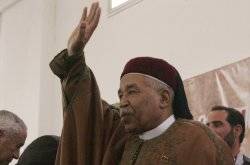Libya leader vows to halt autonomy bid
08/03/2012| IslamWeb
Libyan leader Mustafa Abdel Jalil has said he will defend national unity "with force" after tribal leaders and a political faction declared that the east would become a semi-autonomous region.
"We are not prepared to divide Libya," Jalil said on Tuesday night, calling on eastern leaders to engage in dialogue and warning them against remnants of the former regime in their ranks.
"They should know that there are infiltrators and remnants of [Muammar] Gaddafi's regime trying to exploit them now, and we are ready to deter them, even with force," he said in televised remarks.
A meeting on Tuesday attended by about 3,000 tribal and political leaders in the main eastern city of Benghazi declared that the eastern region, historically known as Cyrenaica, would run its own government while leaving certain matters in the hands of national authorities.
Foreign policy, the national army and oil resources would be left to the central government in the capital Tripoli, in western Libya.
"Some Arab nations, unfortunately, have supported and encouraged this to happen,'' Jalil said. "These nations are funding this kind of unacceptable strife ... What happened today is the beginning of a conspiracy against Libya and Libyans."
Jalil declined to name which nations he believed were organizing the effort.
He said the push for autonomy raised the danger of breaking up Libya but that it was understandable, since the east played a pivotal role in the uprising that ended 41 years of Gaddafi's rule. Protests first broke out in Benghazi on February 15, 2011, and quickly led to the fall of the city's military garrison and the withdrawal of regime forces from the east.
Libya was a federal union from 1951 to 1963 during the monarchy of Idris Senussi, which split the country into three semi-autonomous states: Cyrenaica, Tripolitania and Fezzan.
Though others in Jalil's interim administration have previously criticized Gulf nations for meddling in Libya's affairs, Jalil has praised countries such as Qatar, which heavily funded and armed the rebels fighting Gaddafi but has been accused of favoring certain factions in the revolt's aftermath.
Jalil appealed to Libyans for patience and resolve in the face of the country's mounting problems.
Political prisoner made leader
Fadl-Allah Haroun, a senior tribal figure and militia commander, said the declaration aimed for administrative independence, not separation.
"We are not talking about changing the flag or national anthem. We are talking about different administration, a parliament and managing the financial affairs,'' he said.
The Benghazi gathering appointed Ahmed al-Zubair, Libya's longest serving political prisoner under Gaddafi, as leader of its governing council.
Al-Zubair, who is also a member of the NTC, pledged to protect the rights of the region, but also said his council recognized NTC to run Libya's international affairs.
The political leaders and militia commanders promised to end decades of marginalization and named a council to run the affairs of Cyrenaica, which extends from the central coastal city of Sirte to the Egyptian border in the east.
The gathering in Benghazi also rejected an election law which allocated 60 seats for the eastern region out of 200-member assembly, set to be elected in June.
Al Jazeera’s Nicole Johnston, reporting from Tripoli, said the announcement in Benghazi was only the beginning of a process.
“It is certainly significant, but we need to put it into context: first of all, they have announced the formation of a new regional council, and this will actually take a couple weeks to form," she said.
"At this stage, they say they would like independence, but they have not declared independence. At this stage they haven’t even declared a degree of semi-autonomy."
"Libyan people will not stand for it"
Waheed Burshan, a senior NTC representative, said the tribal leaders were looking for political power, whereas ordinary people of the east wanted a unified Libya.
“Well obviously, all Libyans have the right to express their opinion. But the fact is, for Libyans to consider such a split in the country and its governance, I think it is clearly not advisable. The Libyan people will not stand for it," he told Al Jazeera.
"[For] majority of people looking for a unified Libya, the thought of having separate autonomous region it’s definitely not acceptable. I think people will react swiftly on this type of decisions. I think people are discussing the idea of demonstrating for several days to make sure such a thing does not happen."
Al Jazeera’s Hoda Abdel Hamid, who recently returned from eastern Libya, said the decision by the region's tribal leaders and militia commanders would intensify ongoing rivalries.
“People were saying, that according to the 1951 constitution, which is now valid in Libya, there are two capitals: Tripoli as a political capital, and Benghazi as the economic capital. They want that status back," she said.
"They also say we are so far away from Tripoli, a 12-hour drive really - and everything is centralized in Tripoli. For any kind of administrative papers, they have to go all the way and back.
PHOTO CAPTION
Ahmed Zubair al-Senussi, a longtime political prisoner and NTC member, was named leader of the eastern region [AFP]
Aljazeera

